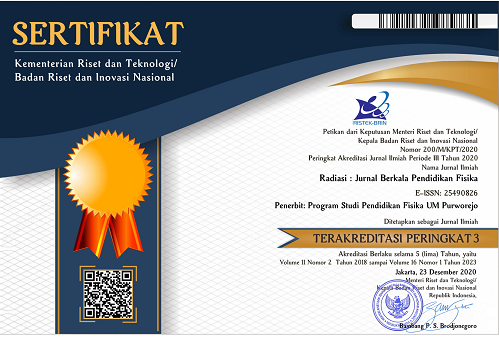Enhancing Computational Thinking Skills Through Physics-Based Worksheet in Linear Motion
Abstract
The physics knowledge consists of many concepts and principles that are generally very abstract. Learning activities should help students understand the concepts by performing a series of activities themself. One of the required thinking skills in the 21st century is Computational Thinking Skills. Computational Thinking is the thinking process required in formulating problems and solutions. This study aims to develop a valid student worksheet and describe the students' response to it. In this research, the development of Computational Thinking-based student worksheet was carried out to be used in Junior High School science learning. Validation was carried out by media experts and subject matter experts. The results from the media experts were a score of 10.65 with an average of 3.55 from a scale of 4.0. While the results from subject matter experts were a score of 3.80 from a scale of 4.0. It can be concluded that the student worksheet received good and reliable categories. The effectiveness test on four students showed an average score of 7.25 in active learning style; an average score of 16.5 in reflective learning style; an average score of 12 in theoretical learning style; and an average score of 12.25 in pragmatic learning style. From these scores, it can be concluded that the dominant learning style of the four students who acted as respondents after following learning using the student worksheet is reflective learning, where students who like to consider experiences and observe learning materials from different perspectives.
Downloads
References
National Science Teacher Association, “NSTA position statement: Quality science education and 21st-century skill,” Sci. Educ., no. Windschitl pp. 1–4, 2009.
J. M. Wing, “Computational Thinking,” Commun. ACM, vol. 49, no. 3, pp. 33–35, 2006.
K. Chaturvedi, D. K. Vishwakarma, and N. Singh, “COVID-19 and its impact on education, social life and mental health of students: A survey,” Child. Youth Serv. Rev., vol. 121, p. 105866, 2021.
W. Wartono, M. N. Hudha, and J. R. Batlolona, “How are the physics critical thinking skills of the students taught by using inquiry-discovery through empirical and theorethical overview?,” Eurasia J. Math. Sci. Technol. Educ., vol. 14, no. 2, pp. 691–697. 2018.
H. Y. Durak and M. Saritepeci, “Analysis of the relation between computational thinking skills and various variables with the structural equation model,” Comput. Educ., vol. 116, pp. 191–202, 2018.
X. Tang, Y. Yin, Q. Lin, R. Hadad, and X. Zhai, “Assessing computational thinking: A systematic review of empirical studies,” Comput. Educ., vol. 148, p. 103798, 2020.
K. O. V.-C. Yailem Arencibia Rodríguez del Rey, Isabel Nissandra Cawanga Cambinda, Claudia Deco, Cristina Bender, Raidell Avello-Martínez, “Developing computational thinking with a module of solved problems,” Comput. Appl. Eng. Educ., vol. 29, no. 3, pp. 506–516, 2021.
C. Gan et al., “ThreeDWorld: A Platform for Interactive Multi-Modal Physical Simulation,” no. NeurIPS. pp. 1–23. 2020.
B. A. Pribadi, Model Desain Sistem Pembelajaran. Jakarta: PT. Dian Rakyat, 2010.
Sugiyono, Metode Penelitian Pendidikan Pendekatan Kuantitatif, Kualitatif, dan R&D. Bandung: Alfabeta, 2015.
V. Fornons, R. Palau, and R. Santiago, “Secondary School Students’ Perception According to their Learning Style of A Mathematics Flipped Classroom,” J. Technol. Sci. Educ., vol. 11, no. 2, pp. 227–244, 2021, doi: 10.3926/JOTSE.1092. 2021.
Eguchi, Amy. "Computational thinking with educational robotics." Society for Information Technology & Teacher Education International Conference. Association for the Advancement of Computing in Education (AACE), 2016.
Rich, Kathryn M., Aman Yadav, and Christina V. Schwarz. "Computational thinking, mathematics, and science: Elementary teachers’ perspectives on integration." Journal of Technology and Teacher Education vol. 27, no .2, pp. 165-205. 2019.
Silva, Ricardo, et al. "Fostering computational thinking skills: A didactic proposal for elementary school grades." Education Sciences vol. 11 no. 9 pp. 518. 2021.
Arista, Fitra Suci, and Heru Kuswanto. "Virtual Physics Laboratory Application Based on the Android Smartphone to Improve Learning Independence and Conceptual Understanding." International Journal of Instruction. vol 11 no.1 pp: 1-16. 2018.
Siahaan, P., et al. "Improving students’ science process skills through simple computer simulations on linear motion conceptions." Journal of Physics: Conference Series.. IOP Publishing, Vol. 812. No. 1 2017.
Pirker, Johanna, et al. "An educational physics laboratory in mobile versus room scale virtual reality-a comparative study." Online Engineering & Internet of Things: Proceedings of the 14th International Conference on Remote Engineering and Virtual Instrumentation REV 2017, held 15-17 March 2017, Columbia University, New York, USA. Springer International Publishing, 2018.
Bogusevschi, Diana, Cristina Muntean, and Gabriel-Miro Muntean. "Teaching and learning physics using 3D virtual learning environment: A case study of combined virtual reality and virtual laboratory in secondary school." Journal of Computers in Mathematics and Science Teaching. Vol. 39, No.1, pp. 5-18, 2020.
Copyright (c) 2023 Fajrul Falah, Dwi Sulisworo

This work is licensed under a Creative Commons Attribution-NonCommercial 4.0 International License.




